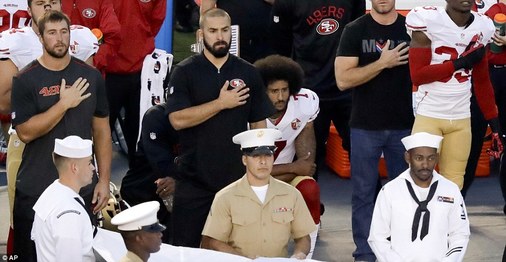 An image of Colin Kaepernick kneeling down during the playing of the national anthem, juxtaposed against the servicemembers standing, holding the American flag.
An image of Colin Kaepernick kneeling down during the playing of the national anthem, juxtaposed against the servicemembers standing, holding the American flag. In the spirit of Constitution Day, the day that celebrates the signing of the Constitution, I thought about the First Amendment in theory versus the First Amendment in practice - the differences between the words themselves and how those words are understood, both as a matter of the privatization of rights protected under the Bill of Rights and the practical consequences of the application of these protected freedoms.
A component of that examination included such controversial speech such as flag burning, the wearing of military medals and rank not earned, and in the news now, kneeling/sitting during the national anthem. Related to these manifestations of speech, it is commonplace for individuals or groups to fervently yell at, or even harass an individual or group that is exercising its First Amendment right, especially when the viewpoint that is being expressed is an unpopular one. However, the articulation of unpopular speech, while potentially earning the speaker the anger of a crowd or a black eye, would likely not result in a criminal conviction for that same speaker. However, on September 9, 2016, a female, African-American United States Navy Sailor elected to sit down for playing of the national anthem. The anthem is played as a morning ritual of the playing of the national anthem on military installations, and it is legally required for active-duty military personnel to either stand at attention or stand with their right hand over their heart, depending on whether the servicemember is in uniform or not. However, before addressing this act, it is important to examine its context.
During the unnamed Sailor's self-made video, she identifies Colin Kaepernick and interprets his actions during her protest. Kaepernick recently garnered attention for kneeling during the national anthem of a NFL preseason game, and he has continued this practice in every game since. This speech has been repeated by multiple athletes, both in the NFL and in other sports. While this practice has received some support from the NFL, and has seen Kaepernick's jerseys become the hottest selling item for the San Francisco 49ers, it is not without vocal dissent from some, but this form of protest, while debated, is not illegal.
However, free speech in the military has been - and continues to be - a delicate balance of individual rights and military necessity. While freedom of speech is a right protected by the Constitution - the same Constitution that military members swear to uphold and protect - there are content-based restrictions on speech for military members. Contemptuous speech towards the President or Congress is specifically criminalized, but that must be balanced with the freedom of members to write their Member of Congress and express frustration or displeasure. Certainly less contemptuous, but demonstratively, in 1981, an Air Force officer who was an Orthodox Jew and ordained rabbi, while testifying at a court-martial, was ordered to remove his yarmulke. Subsequently, he was ordered to remove his yarmulke while indoors, since wearing headgear while indoors was prohibited. The Supreme Court ruled that the rabbi's desire to wear his religious garb was superseded by the military regulation barring headgear. While Congress subsequently changed the law to explicitly permit religious headgear on military members, this case highlights the inherent tension between constitutional rights and military authority.
In the case of the unnamed Sailor and her protest, there is little challenge to the veracity to her claim, but the striking notion is the level of consequence that she has exposed herself to. While it is unlikely, she could be charged with multiple offenses, and if convicted, she could face several years of time in prison, in addition to the federal conviction itself. More likely, she faces either administrative separation - essentially, being fired - from the Navy, non-judicial punishment - an administrative tool that has less due process rights than other forums, but also has less severe consequences (typically, loss of rank and/or forfeiture of pay are the most common punishments if found guilty at this forum) - or informal counseling. While the decision to act or not to act is likely being discussed, and there are deep, cultural and institutional reasons for this separation between the civilian right to freedom of speech and the servicemember right of freedom of speech, the salient point is not whether she will be charged or not, but that the military's need for obedience and "good order and discipline" creates separation such that the very rights of Kaepernick that the Sailor defends are not available to her, expanding the civil-military gap (that is, the potential for divergence in views among civilian and military elites) at one of its widest points, the institution of law.
As evidenced in the case involving the rabbi and many other cases, the Supreme Court is very deferential to the military, going so far as to apply an extraordinarily favorable policy called the "military deference doctrine." Generally, this doctrine presupposes that the military has a good reason for instituting a particular rule or policy and the Court is loathe to interfere with that which it doesn't understand. Rather, the Court will defer to the logic and policy of the military in most every type of case, and especially so as it relates to law and legal policy. As a result, we see that as it relates to the military and its members, the First Amendment has a very different understanding for military members than it does for the general public, widening the civil-military divide and drawing an important line between the nature of the person protesting, as opposed to the act of their protest.
A component of that examination included such controversial speech such as flag burning, the wearing of military medals and rank not earned, and in the news now, kneeling/sitting during the national anthem. Related to these manifestations of speech, it is commonplace for individuals or groups to fervently yell at, or even harass an individual or group that is exercising its First Amendment right, especially when the viewpoint that is being expressed is an unpopular one. However, the articulation of unpopular speech, while potentially earning the speaker the anger of a crowd or a black eye, would likely not result in a criminal conviction for that same speaker. However, on September 9, 2016, a female, African-American United States Navy Sailor elected to sit down for playing of the national anthem. The anthem is played as a morning ritual of the playing of the national anthem on military installations, and it is legally required for active-duty military personnel to either stand at attention or stand with their right hand over their heart, depending on whether the servicemember is in uniform or not. However, before addressing this act, it is important to examine its context.
During the unnamed Sailor's self-made video, she identifies Colin Kaepernick and interprets his actions during her protest. Kaepernick recently garnered attention for kneeling during the national anthem of a NFL preseason game, and he has continued this practice in every game since. This speech has been repeated by multiple athletes, both in the NFL and in other sports. While this practice has received some support from the NFL, and has seen Kaepernick's jerseys become the hottest selling item for the San Francisco 49ers, it is not without vocal dissent from some, but this form of protest, while debated, is not illegal.
However, free speech in the military has been - and continues to be - a delicate balance of individual rights and military necessity. While freedom of speech is a right protected by the Constitution - the same Constitution that military members swear to uphold and protect - there are content-based restrictions on speech for military members. Contemptuous speech towards the President or Congress is specifically criminalized, but that must be balanced with the freedom of members to write their Member of Congress and express frustration or displeasure. Certainly less contemptuous, but demonstratively, in 1981, an Air Force officer who was an Orthodox Jew and ordained rabbi, while testifying at a court-martial, was ordered to remove his yarmulke. Subsequently, he was ordered to remove his yarmulke while indoors, since wearing headgear while indoors was prohibited. The Supreme Court ruled that the rabbi's desire to wear his religious garb was superseded by the military regulation barring headgear. While Congress subsequently changed the law to explicitly permit religious headgear on military members, this case highlights the inherent tension between constitutional rights and military authority.
In the case of the unnamed Sailor and her protest, there is little challenge to the veracity to her claim, but the striking notion is the level of consequence that she has exposed herself to. While it is unlikely, she could be charged with multiple offenses, and if convicted, she could face several years of time in prison, in addition to the federal conviction itself. More likely, she faces either administrative separation - essentially, being fired - from the Navy, non-judicial punishment - an administrative tool that has less due process rights than other forums, but also has less severe consequences (typically, loss of rank and/or forfeiture of pay are the most common punishments if found guilty at this forum) - or informal counseling. While the decision to act or not to act is likely being discussed, and there are deep, cultural and institutional reasons for this separation between the civilian right to freedom of speech and the servicemember right of freedom of speech, the salient point is not whether she will be charged or not, but that the military's need for obedience and "good order and discipline" creates separation such that the very rights of Kaepernick that the Sailor defends are not available to her, expanding the civil-military gap (that is, the potential for divergence in views among civilian and military elites) at one of its widest points, the institution of law.
As evidenced in the case involving the rabbi and many other cases, the Supreme Court is very deferential to the military, going so far as to apply an extraordinarily favorable policy called the "military deference doctrine." Generally, this doctrine presupposes that the military has a good reason for instituting a particular rule or policy and the Court is loathe to interfere with that which it doesn't understand. Rather, the Court will defer to the logic and policy of the military in most every type of case, and especially so as it relates to law and legal policy. As a result, we see that as it relates to the military and its members, the First Amendment has a very different understanding for military members than it does for the general public, widening the civil-military divide and drawing an important line between the nature of the person protesting, as opposed to the act of their protest.


 RSS Feed
RSS Feed
